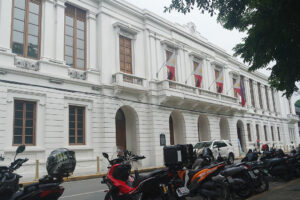Disagreement fatigue

Listening to Bishop Robert Barron on his Word on Fire videocast while having a lethargic breakfast. He does spark some energy over a seemingly predetermined day of continued languishing in the long-playing COVID pandemic. His topic on that dank and dreary morning singed the consciousness: Am I experiencing what is called “Disagreement Fatigue,” or a refusal to argue for, and defend what I think is right? Am I just languishing in non-controversial, non-adversarial lethargy?
Bishop Barron takes off from an article by Evangelical apologist Natasha Crain, “Disagreement Fatigue” in which she predicted that from the violent upheavals of 2020 (the pandemic, world recession, US elections, racial protests, terrorism, wars), people in 2021 and onward for some yet unknown number of years more will refrain from controversy and indulge in passivity, perhaps to lessen stress and anxiety. “Many people are looking for easy harmony rather than knowledge to help them better engage when there’s an opportunity to do so,” Crain says.
Yes, Bishop Barron agrees that religion and politics are sure-fire topics for arguments, often leading to fights. But he cautions against the creeping “Disagreement Fatigue” that deadens and kills mind and soul more than physical violence or social rejection. Is the present growing inclination to non-controversy more noticeable among generational levels? Well, maybe because they are more in numbers, the millennials and Generation X are observed to be more “allergic to disagreements,” Bishop Barron observes. Their independence and individuality are abetted by social media, in which responses are often “snarky one-liner comments which are not arguments at all.”
And Bishop Barron cites the growing-up stories of the post-1960s generations, JRR Tolkien’s The Hobbit and Lord of the Rings. Bilbo Baggins, the elder of the Shire has a perfect little hobbit house with all the amenities that symbolize peace and harmony in the village. Yet his nephew, Frodo, decides to leave the Shire to join and defend the Fellowship of the Rings, suffering trials and tribulations in the adventure, guided by the strict and exacting good wizard, Gandalf.
Such is moral strength: we must leave our safe space to be relevant and helpful to others, in the love and service to God and fellowmen. “If you are afraid to go out, you are not alive,” Bishop Barron admonishes. He echoes the challenge of St. John Paul II who repeatedly quoted Luke 5:4, “Duc in altum!” Jesus said that from Simon Peter’s boat when He was recruiting His disciples: “Put out into the deep” — cast your nets and be fishers of men. And the chosen apostles, were amazed at how heavy their nets were with the catch.
Be proactive — cast your net forth like the Apostles. Be adventurous — like Frodo venturing out from the Shire (tradition, a “safe place”). Yet Bishop Barron (pejoratively dubbed “Bishop of the Internet” by critics) is not without controversy for his actively coming forth in defense of liberal changes in the Catholic Church post-Vatican II and of Pope Francis. Now still battling against “Disagreement Fatigue” (also called Indifference), Bishop Barron has not relented despite open criticism by some Catholics who violently protest controversies against gay marriages, sex-offender priests, and pro-choice/abortion, among others. He was most controversial at the 2020 US Presidential Elections, when American Catholics were divided between Republican re-electionist Donald Trump (a non-denominational Christian) who was against legalizing abortion, and Democratic candidate Joe Biden (a Roman Catholic) who toed his party line of free choice for abortion. Bishop Barron endorsed Biden, considering that even if a law legalized abortion for the overwhelming 78% majority of US citizens who are not Roman Catholics, the Roman Catholics would still be bound in conscience by the law of the Church against abortion.
Yes, mundane politics insinuates into the spiritual, mental, emotional and physical lives of all. Pope Francis said in a Sunday homily, “A good Catholic meddles in politics, offering the best of himself, so that those who govern can govern. None of us can say, ‘I have nothing to do with this, they govern.’ Citizens are responsible for participating in politics according to their ability, and in this way are responsible for their leadership” (https://www.catholicnewsagency.com, Sept. 16, 2013).
The Pope reiterated this at the recent international video conference, “A Politics Rooted in the People,” saying “the true response to the rise of populism is precisely not more individualism but quite the opposite: a politics of fraternity, rooted in the life of the people.” In his message in his latest book Let us Dream, he calls this “a politics with a capital P, politics as service, which opens new pathways for the people to organize and express themselves.” This type of politics, he continues, is “not just for the people, but with the people, rooted in their communities and in their values” (https://www.vaticannews.va, April 15, 2021).
Pope Francis and Bishop Barron might have been talking to us Filipino Roman Catholics, estimated at 85% of the population, or about 84 million in 2015 (inquirer.net, Aug. 11, 2013). We have most crucial national elections coming up on May 9, 2022. In this time of critical discernment about whom should we choose to be our next leaders in government, we are still focused on our health and survival in the stranglehold of the terrible COVID pandemic that has lorded over our lives since early 2020. It’s just too much!
Are we experiencing what is called “Disagreement Fatigue,” or a refusal to argue for and defend what we think is right? Are we just languishing in non-controversial, non-adversarial lethargy?
We know our present governance well enough, whether we are pro- or anti- the ruling leaders, or for or against those wanting to be voted into power come May 9, 2022. Sad to say, but the differences in opinion or choice may sometimes boil down to net effect on personal circumstances or expectations. The pan-rattling of oppositionists in social media (where else, no choice in the pandemic) is countered by the massive erosion of Truth from the deluge of Fake News by paid trolls. Lying and cheating by candidates who have re-invented themselves and revised history is acceptable, even that the money stolen from the country is re-packaged as “gifts” to the needy.
Does the protest noise even penetrate the patched-up hovels of the poor, who hear and feel only the rumbling of empty stomachs? The country’s poverty rate is projected to average between 15.5% and 17.5% in 2021, likely near the 16.6% posted in 2018, officials of the National Economic and Development Authority said. Joblessness will remain elevated at around 7% to 9% by 2022 (Rappler, Feb. 4, 2021). Perhaps only those who have the wherewithal can indulge in the perverse luxury of anxieties and depression about the recklessly careening future of the country and of the family and worry about the coming national elections.
No time for “Disagreement Fatigue.” Time to venture out from “Safe Space” for those who can do something for good, honest elections. Reach out to the misled or unconcerned to vote for good leaders who will selflessly serve the people. Help positively and actively to realign the collective consciousness to what is Right and Good, to Truth and Justice.
Duc in altum!
Amelia H. C. Ylagan is a doctor of Business Administration from the University of the Philippines.




